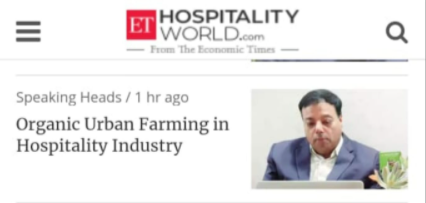Many chefs and food advocates have appreciated the idea of buying local produce, providing fresher chemical free food and having direct contact with producers, but urban agriculture is more than just a source of fresh fruits and vegetables.
BY Dr. Mukesh Kwatra
In a world with a vision of sustainable future and increasing urbanization, organic food has become a buzzword. Hotels around the world have joined the revolution and have their own fertile gardens and farms to produce organic food, this is what the agricultural box uses the latest urban planting technology to provide. Urban farming refers to the practice of cultivating plants and raising animals within and around cities. Many chefs and food advocates have appreciated the idea of buying local produce, providing fresher chemical free food and having direct contact with producers, but urban agriculture is more than just a source of fresh fruits and vegetables.
The community contributes to the local economy and creates a functional ecological space. As the global urban population grows at more than twice the rate of rural population growth, people are increasingly aware that urban agriculture may play a key role in urban resilience. According to the Food and Agriculture Organization of the United Nations, urban gardens are way more productive than rural farms, only one square meter can provide 20 kilograms of food per year; in addition, urban agriculture can be a possible solution to the problem of climate change playing an important role in global food security.
This is not only happening in hotels near lush pastures and fertile fields, but also gardens are being built in the townhouses of the largest chain stores, which add to the kitchen shopping list. Moreover, user-friendly, ergonomic and transportable solutions are catalyzing the business of urban farming. The growing urban farming movement transforms the food system around the world by reducing food waste. With a third of all meals being thrown away each year, meals waste charges one trillion dollar annually, and generates tonnes of carbon dioxide equivalent, there’s lots of room for organizations to profit even as additionally reducing greenhouse emissions related to farming and transport.
A hotel in Florida did something unusual for the high-end hospitality industry. It started farming. The hotel has an indoor hydroponic vertical growing system. In hydroponic farming plants are grown in mineral nutrient solutions in water instead of soil. The Hotel produces a large portion of the greens there, that is served at its restaurants, from lettuce to spinach, cabbage and assorted micro-greens.
Besided hydroponics, aquaponics, aeroponic or aquaponic technology also plays an important role in the hotel’s greenhouse system. Natural fish excrement provides organic nutrients to plants. In turn, plants purify water so that fish can thrive and live a natural life and subsequently resources continue to circulate.
Developed nations around world have already started working over the idea supplemented with several start ups hopping into the process. There is also a host of startups facilitating small scale urban farming in metropoilitian cities of India, not only for individual families to grow fresh organic vegetables on their rooftops but also for various institutions like hotels, hospitals, schools etc. The vacant large rooftops are now more and more being transformed into large lush green roof farms.
Besides providing a healthy alternative these efforts have many potential benefits, including helping social movements; economic development, creating local businesses and employment opportunities; environmental education, public works and local food security.
Sustainable Tourism and Eco-Tourism is now increasingly becoming popular. Subsequently, the hospitality industry is now taking active steps to minimize their carbon footprint and are shifting to adopting organic farming and using renewable energy in tandem with the regional heritage of the surroundings. Hotels across India and globally are attracting tourists and guests by offering an organic way of lifestyle.
Cultivating land in the city opens up the gates to the transition to a decentralized mindset that can fix diverse problems.
On the other hand, it has been observed that many small informal consumer networks have been established in developing countries. These consumers are looking for quality organic food and have confidence in the production farmers who interact with them, which means they don’t have to question the authenticity of food labels on supermarket groceries. These urban farmers have high-quality arable land resources and are relatively easy to adapt to changing climatic conditions.
However, time will only answer this initiative; sustainability is the key to the hospitality industry’s future and organic urban farming is a bright hope to the cause.


